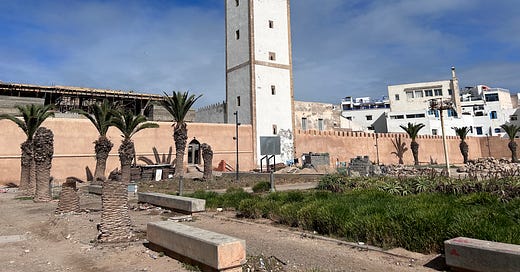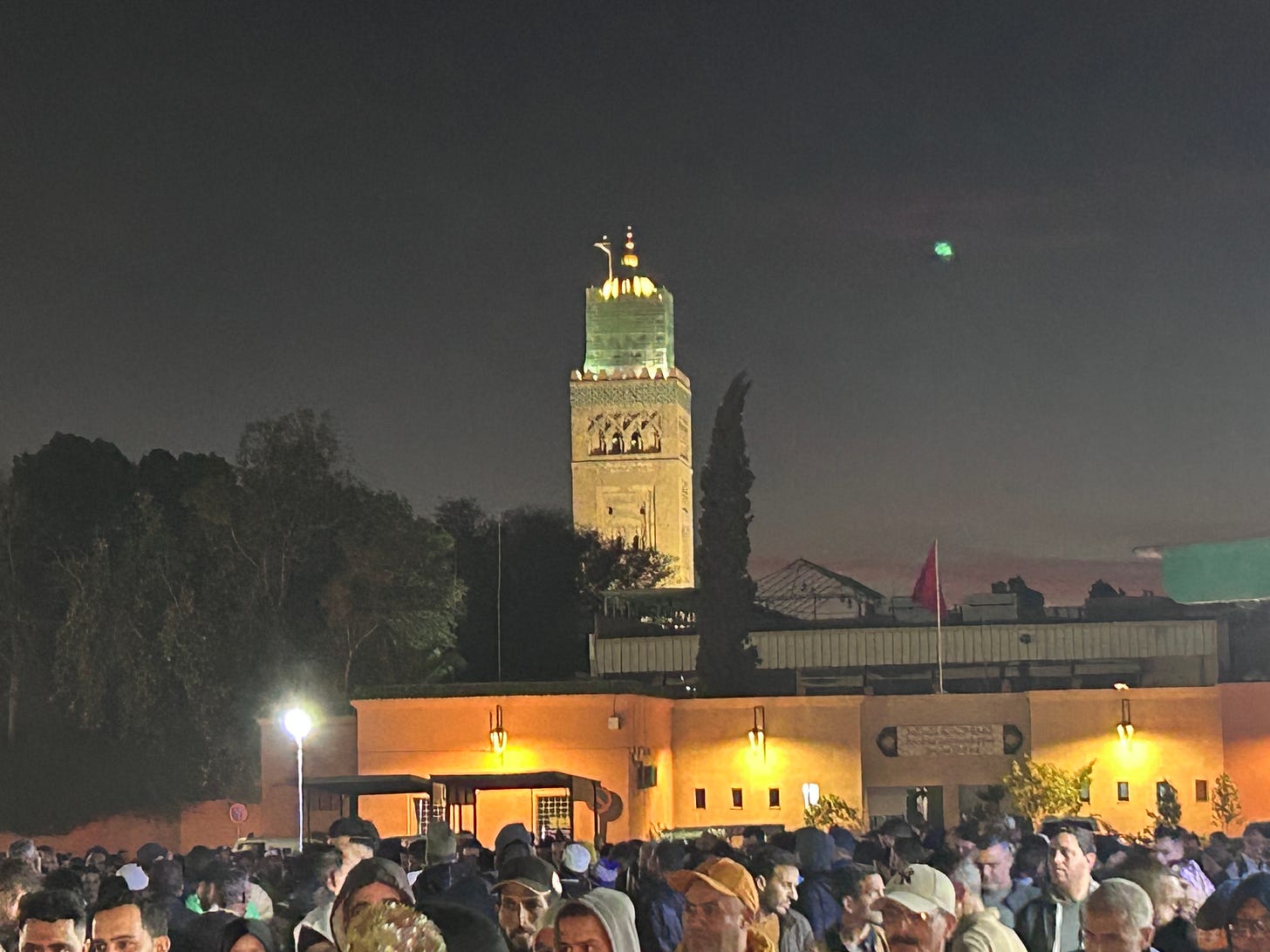Morocco has been near the top of my list of countries to visit for a very, very long time, and it has probably been at the tip top since I made it to Namibia eight or nine years ago. It has been at or near the top of my list for so long that I’m not even sure what will supplant it now. Maybe Vietnam. Maybe Freedonia.
Morocco is, for lack of a better word, magnificent, and that’s the number one reason I wanted to go there. (Note: Before I’d ever hear of the country of Morocco, I knew the phrase “Magnificent Morocco” from professional wrestler Don “The Magnificent” Muraco, a native Hawaiian who helped King Kong Bundy brutalize Hulk Hogan in the run up to WrestleMania 2. Muraco would, following a turn to the light side, become known as “The Rock” Don Muraco, before the nickname was eventually stolen by some young punk. I can’t tell you how surprised I was when I turned into the sitcom “Young Rock” and didn’t see video of young Don grappling for the famed Punahou School.)
I probably first became interested, truly interested, in Morocco when I learned about the Barbary Pirates in my high school “Euro-American” history class. Many of the Barbary Pirates did not operate out of what is now Morocco. On the other hand, many did. Indeed, Morocco was both the first country to recognize the United States in 1777 and, according to Wikipedia, so only maybe true, the first country in the region to seize a U.S. vessel in 1784. (But seriously, the above is cribbed almost entirely from Wikipedia, so please go there directly, so I can remain a viable candidate for President of Harvard.)
The brief war between a U.S. government tired of paying tribute to Barbary pirates and the Barbary States became one of my favorite historical events along with the Zimmerman Telegram (note: alternative history novel right there—what if Mexico reconquered the Southwest in 1917) and the saga of labor leader “Big” Bill Haywood (note: because I like calling people “Big Bill” for unclear reasons.) Part of my interest in this war is that prior to high school, I had never heard of it. In my young mind, U.S. wars preceded in a nice, well-defined line: French and Indian, Revolutionary, 1812, Mexican-American, Civil, Spanish-American, WWI, WWII, Korea, Vietnam. I knew there were also wars with various American Indian tribes, but I didn't count them because, well, idiocy. So finding out that there was this sort of unknown event was a revelation. It meant there were probably more. It explained that the “shores of Tripoli” in the Marines’ Hymn did not have to do with the 1986 U.S. bombing of Tripoli, which had never made sense, since I’d learned the Marines’ Hymn in 1983.
In its own strange way, the existence of the Barbary Wars taught me that history was subtile, that things of the greatest importance in the moment may be forgotten in the future, and there is never, ever, just one “history.” Additionally, we watched a fun film strip on them them one day in history class. The filmstrip’s visuals suggested that the marine landing in North Africa had been comprised of four marines and a dog. Presumably, we watched the film strip because the history teacher was hung over.
From there, my interest in visiting Morocco became increasingly a case of dime story Orientalism—it seemed exotic. There are certain places in this world with names that are redolent of magic: Timbuktu, Kathmandu, Khartoum, Cleveland. But Morocco is the only place I can think of off-hand that is full of them: Tangier, Marrakech, Fez, Agadir, Casablanca. This is a country where magic is afoot.
Indeed, as we planned the trip the sheer number of mystical sounding places became an impediment to planning. How was I to know that Casablanca, despite the romance in its name and cinematic history, is basically a big modern city, while Fez, redolent of hats, is the real heart of the magic? By reading the guidebook, it turned out.
But realistically the country is to big, there is too much to see, vacation is too short, and my kids are too resistant to being in the car for 40 hours in a nine day period to see everything I wanted, so we made a choice. Instead of taking duplicating the remarkable voyage my cousin had taken with his family just a year before crossing the Straits of Gibraltar to Tangier, and then visiting Fez, the blue city of Chefchaouen, the Sahara, and Marrakech, a journey that had left him and his wife fantasizing daily about a move, we would stick to Marrakech, Agadir, and Essaouira. No drives longer than four hours.
We did, however, use my cousin’s guide. Well, we called my cousin’s guide, Aissam, who was wonderful but unavailable during our window, so he made our arrangements and introduced us to Abdelkadir, another independent guide from his desert town of Ouarzazate.
Even though he wouldn’t be guiding us, Aissam was in constant communication, tweaking the itinerary as we dismissed more and more great ideas as unrealistic with kids, and literally calling us to ask for C’s measurements so he could ensure that he got a baby crib of the correct side. (Note: I do not know my son’s height centimeters.) (Additional note: I also do not know my son’s height in inches.)
We spent the first two days on our own in Marrakech before meeting Abdelkadir, a gentle, moustachioed fellow with a penchant for playing the Berber banjo and driving very slowly in order to avoid the constant radar traps along Morocco’s highways and byways. Abdelkadir spoke little English, a fact we knew going in, so French became the common language.
Abdelkadir was a man of the desert who thought that going to Morocco and focusing on the coast rather than the desert interior was insane. He told us regularly that the desert was where it was really at, while at the same time going to substantial lengths to make sure we had an amazing trip in the non-desert.
When we would make a request to Abdelkadir that did alter from his idea of the trip, he would frequently say that this would not be as good as doing what he would recommend, and this was why, but it was our vacation and he would happily do whatever we wanted, no matter how much worse it was than his idea.
This might have been annoying, save for the fact that he was usually right. For example, I had imagined getting up early and starting our activities by 8, whereas Abdelkadir strongly urged us to relax and try to start the day at 9:30. I was annoyed but relented. It turns out that in February, Morocco’s central coast is still pitch black at 8:00, so I missed out on several hours of explaining to my kids why they were up before the sun.Point for the guy who actually knows the place.
Needless to say, we liked him enormously, and if you want to go to Morocco and speak French, drop me a line and I’ll give you his number.
Over the next few posts, I’ll be getting into the nitty gritty of our trip, from the snake charmers of Marrakech, to the acrobats of Agadir, to the… Game of Thrones fanatics of Essaouira.
But let me conclude this initial installment by saying this: Morocco is right up there with Malawi and Myanmar/Burma among the friendliest countries I have ever visited. The Burmese are incredibly friendly, but their history, including their recent history, has some extremely dark elements, so please know that nice may not necessarily equal good, but the Moroccans were almost to a person warm, kind, engaging, and honest. Except, funnily, our driver from the airport to our accommodation in Marrakech. I don’t know that he was a bad guy, but he had not been informed that we were coming, so he had to cram us into his vehicle with a Danish family going to the same Riad (note: a riad is a sort of a family hotel). He spend the entire drive screaming in Arabic into the phone, possibly at a woman named Fatima. I still tipped him. The Danes did not.
Based on my trip to Egypt more than 20 years ago, I had worried that Moroccans would be pushy, aggressive, and desperate to extort baksheesh (Arabic for tip… or sometime bribe) from tourists at every opportunity. Nothing could have been further from the truth. One could walk into a shop in the souk and look around freely with no one giving you a hard sell. No one demanded money for telling you where the bathroom was (note: though they might give you a stink eye if you didn’t leave a few dirham after using the bathroom), and no one demanded payment for informing you that the ceiling of the room in the center of the pyramid was, in fact, a ceiling. I am not saying all, or even most, Egyptians are difficult, I am only saying that many of those close to the tourist bubble are. But Morocco is not Egypt, and terrible job by me equating them.






